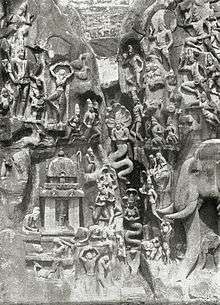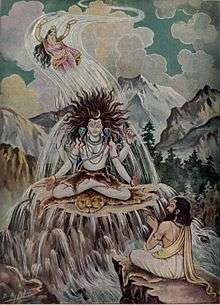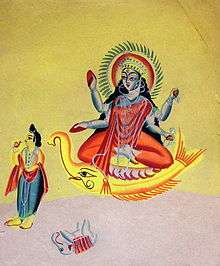Bhagiratha
| Bhagiratha | |
|---|---|
| Grandson of Sagara | |
 Shiva bearing the Descent of the Ganges River, as the goddess Parvati, Bhagiratha, and the bull Nandi look on (circa 1740). |
Bhagiratha (Sanskrit: भगीरथ, bhagīratha) was a great king who brought the River Ganges, personified as the river goddess Ganga, to Earth from the heavens. When he was prince of Sagar Dynasty, he did penance for a thousand years to gain the release his 60,000 great-uncles from the curse of saint [Kapila]in the Patala loka. While saint Kapila was meditating from years and when the 60,000 uncles were shot by the fire from the saint's eye when he was disturbed which eventually led Bhagiratha to descent of the goddess Ganga in the form of the river Ganges, to the earth when Bhagiratha heard all this ROM his mother and went to meditate for his 60,000 uncle's last spiritual activities [1] To commemorate his efforts, the head stream of the river is called Bhagirathi, till it meets Alaknanda River at Devprayag.
Early life
Bhagiratha was the king of Kosala, a kingdom in ancient India. He was a descendent of the great King Sagara of the Suryavansha, or Surya Dynasty. He was one of the forefathers of Lord Rama, of the Ramayana, the epic in which Bhagiratha's tale is primarily recounted.
He lost his father when he was just a child, and was raised by his mother. Bhagiratha was very intelligent, virtuous and kind hearted. When he came of age, Bhagiratha ascended to the throne of the kingdom of Kosala, today located in the Indian state of Uttar Pradesh. He was a benevolent ruler who adhered to his duties as a king as prescribed by dharma.
Bringing the Ganges to Earth
Kapila's curse
When king Sagara chose to perform the Ashwamedha yagna, his royal agents lost track of the sacrificial horse. Sagara ordered his sixty thousand sons by Sumati to track down the horse. The proud and mercurial prince raged across Bharatha, burning down forests and uprooting life and property to find the horse. They finally arrived at a quiet spot where the Sage Kapila was sitting in meditation. Beside him was tied the white horse. The enraged prince condemned Kapila as a thief and attacked him. When the sage opened his eyes, his immense power turned the princes into ashes.
Another version has it that Indra who wanted to end sage Kapila's meditation took the horse and tied it in his ashram. It is said that generally the devatas would try to distract rishis in meditation from becoming too powerful.
One version has it that Kapila told the prince Anshuman, Sagara's grandson (Son of Asamanjan, other son of Sagara who was thrown out of kingdom by him) who had come looking both for the horse and his uncles, that the only way for the souls of the dead prince to ascend to heaven would be through the offering of niravapanjali with the water of the sacred Ganga (Ganges) river, which was flowing only in Swarga.
Another version has it that Anshuman was told about the fate of his 60,000 uncles and about relief from Kapila the saints curse (by Ganga's waters) by Garuda.
Bhagiratha's tapasya

Bringing Ganga back to Earth was a near impossible task and required many years to be spent in tapasya and prayer. The Kosala kings of successive generations could not do this while managing their duties as kings. As a result, the sins of the thousand princes multiplied in their destructive energy, and began resulting in natural disasters. The kingdom began to lose its peace and prosperity, and by the time Bhagiratha ascended the throne, he found it impossible to govern.
Bhagiratha turned over the kingdom to his trusted ministers and set off to the Himalayas to perform an arduous tapasya in the extreme climate. For one thousand years, he performed an excruciatingly harsh penance to please Lord Brahma. At the end of the thousand years, Brahma was pleased and asked him for his wish. Bhagiratha asked Brahma to bring the river Ganges down to earth so that he may perform the ceremony for his ancestors.
Brahma asked Bhagiratha to propitiate Lord Shiva, for only He is capable to break Ganga's landfall. Ganga has a strong flow and it would have been impossible for anyone to contain the destructive impact of this event except Shiva.
Bhagiratha performed a tapasya for Lord Shiva, living only on air. The compassionate Shiva appeared only after a year's penance, and told Bhagiratha he should not have to perform tapasya to accomplish a noble goal such as this. He assured Bhagiratha that he would make Ganga fall on his matted locks (dreadlocks).
Ganga's fall

After aeons of being flattered and praised by the Devas, Ganga had become vain. She scoffed at Brahma when he asked her to flow down to earth, but could not disobey him as he was her father.
But Ganga was sure, as much as Bhagiratha was afraid that no one could stop her fall, which would devastate the earth for a long time. As she cascaded down from Swarga, Bhagiratha and celestial observers were terrified of the roar and volume of water coming down. But Lord Shiva appeared under the flow and captured all of Ganga in his jataa just before she fell on earth. Ganga came to the earth because of Bhagiratha's efforts so Ganga is also called Bhagirathi.
Ganga struggled to set herself free, but Shiva could not be budged. Bhagiratha worshipped Shiva, who let Ganga go free after crushing her vanity. She flowed in a destructive manner and destroyed Jhuhnu rishi's ashram. This angered Jhuhnu and took Ganga as aposhanam. Bhagiratha again prayed for Jhuhnu to let out Ganga and Jhuhnu let her out. Hence, Ganga is also known as Jahnavi. Ganga then flowed over the remains of the 60,000 ancestors of Bhagiratha and brought them moksha. It is still believed to flow, from Shiva's jataa down to earth with a gentler force.
Establishment of the river

Bhagiratha led the way for Ganga on his chariot, and she followed him across the north and east of Bharat and finally merging with the ocean. In her course she washed the ashes of Sagara's sixty thousand sons, who ascended to heaven while praising and blessing Bhagiratha.
Commemoration
For its descent to Earth being owed to Bhagiratha's efforts, Ganga is also known as Bhagirathi (daughter of Bhagiratha) as proclaimed by Lord Brahma.
Bhagiratha's own great effort was praised by all the Gods and his ancestors, and is known as a Bhagiratha Prayatna, as proclaimed by Lord Brahma. It is a great inspiration to any man who seeks to do something noble despite facing overwhelming odds.
See also
References
- ↑ Mankodi, Kirit (1973) "Gaṅgā Tripathagā"Artibus Asiae 35(1/2): pp. 139-144, p. 140
Sources
- The Ramayana (2001) by Ramesh Menon
- http://moralstories.wordpress.com/2006/05/14/hard-work-can-do-wonders/
- Dictionary of Hindu Lore and Legend (ISBN 0-500-51088-1) by Anna L. Dallapiccola
- The story of Baghiratha in western edition
